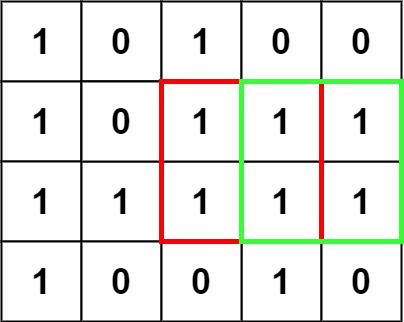LeetCode-in-All
221. Maximal Square
Medium
Given an m x n binary matrix filled with 0’s and 1’s, find the largest square containing only 1’s and return its area.
Example 1:

Input: matrix = [[“1”,”0”,”1”,”0”,”0”],[“1”,”0”,”1”,”1”,”1”],[“1”,”1”,”1”,”1”,”1”],[“1”,”0”,”0”,”1”,”0”]]
Output: 4
Example 2:

Input: matrix = [[“0”,”1”],[“1”,”0”]]
Output: 1
Example 3:
Input: matrix = [[“0”]]
Output: 0
Constraints:
m == matrix.lengthn == matrix[i].length1 <= m, n <= 300matrix[i][j]is'0'or'1'.
Solution
#include <stdio.h>
#include <stdlib.h>
int min(int a, int b) {
return a < b ? a : b;
}
int min3(int a, int b, int c) {
return min(a, min(b, c));
}
int maximalSquare(char** matrix, int matrixSize, int* matrixColSize) {
if (matrixSize == 0 || matrixColSize[0] == 0) {
return 0;
}
int m = matrixSize;
int n = matrixColSize[0];
// Create a dynamic programming (dp) array initialized to 0
int** dp = (int**)malloc((m + 1) * sizeof(int*));
for (int i = 0; i <= m; i++) {
dp[i] = (int*)calloc(n + 1, sizeof(int));
}
int max = 0;
// Fill the dp array based on the matrix values
for (int i = 1; i <= m; i++) {
for (int j = 1; j <= n; j++) {
if (matrix[i - 1][j - 1] == '1') {
dp[i][j] = 1 + min3(dp[i - 1][j], dp[i][j - 1], dp[i - 1][j - 1]);
if (dp[i][j] > max) {
max = dp[i][j];
}
}
}
}
// Free allocated memory for dp array
for (int i = 0; i <= m; i++) {
free(dp[i]);
}
free(dp);
return max * max;
}

